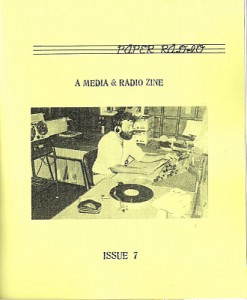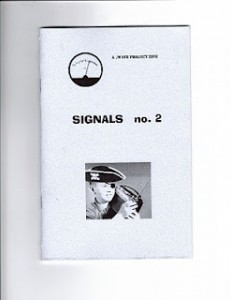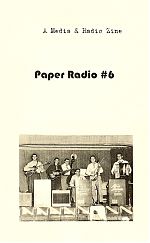It’s been over a year since I’ve profiled a Radio Obsessive for Radio Survivor and I’m glad to say that I couldn’t resist the opportunity to learn more about DJ Frederick and his Paper Radio ‘zine. According to the Paper Radio blog, “Paper Radio is about shortwave listening, free radio, community radio, DIY media and evolves from there.”
Fellow Radio Survivor Paul Riismandel recently reported on Paper Radio and it reminded me that I’d interacted with DJ Frederick last year when he asked to reproduce my feature about Lew Houston’s work to document the history of college radio station WRKU. After taking a look at DJ Frederick’s latest output, it was clear that he deserved full-on Radio Obsessive treatment.
DJ Frederick (aka Frederick Moe) is a long-time radio DJ and has been publishing ‘zines for about a decade. His fascination with radio extends across numerous categories, including college radio, pirate radio, and shortwave radio. His first radio gig was in 1976 at WUNH and these days he has does the show “Radio Thrift Shop” at Colby-Sawyer College radio station WSCS.
Paper Radio covers a wide range of DJ Frederick’s interests. Earlier versions of the ‘zine (under a different name) even included a CD sampler featuring a range of snippets of radio broadcasts. The latest issue of Paper Radio (#9) just came out a few weeks back with stories about famed DJ John Peel, The Amateur Radio Hurricane Network, Occupy Shortwave, and the Voice of Next Thursday radio show/blog. To get more insight into the man behind the ‘zine, I recently conducted an interview with DJ Frederick over email about his radio obsession. Thanks so much to DJ Frederick for chatting with me about his fascination with radio.
Jennifer Waits: What’s the goal of Paper Radio and how often do you publish it?
Frederick Moe: My hope with Paper Radio is to turn people on to the diversity and magic that radio offers us. I am hoping that media geeks and novices alike will read the zine and learn about something different. I have published Paper Radio three or four times a year for the past several years. It’s a grueling schedule for a solitary zinester.
Jennifer: What prompted you to start writing about radio and when did you begin with your first ‘zine? How did Paper Radio evolve from your other ‘zine projects?
Frederick: In 1999 I reconnected with radio in a major way, started listening to shortwave, became a DJ at my local college radio station. Around the same time I reconnected with both reading and writing zines. It seemed that radio and its endless varieties was an unexplored topic in the zine world. Pirate radio and shortwave listening have always been central to the zine projects. My earlier zines were called the /wave project and each had a title: short/wave, air/waves and so on. This was in the very early 2000s. Around 2007, I started calling the zine project Signals and in 2011 someone wrote that reading my zine was like listening to a radio show on paper. Eureka! A new title was born.
Jennifer: I thought it was cool that a copy of your early ‘zine included a CD with tidbits from pirate radio stations. Do you still incorporate audio into any of your issues?
Frederick: The audio CDs were a lot more work than I expected! There were five variations of the CD that included audio from pirate stations KIPM, Undercover Radio, Mystery Science Radio, WMYN, and The Purple Nucleus of Creation. I abandoned the notion of including CDs after including them with a couple of issues and receiving no encouraging feedback. At some point in the future if I feel inspired I might release an all audio version (sans print) of Paper Radio on CD or mp3.
Jennifer: How do you find story ideas for Paper Radio?
Frederick: The story ideas seem to find me in moments when I’m not looking. There are dozens left to do – favorite dj heroes, the first song you remember hearing on the radio, the weirdest thing you’ve ever heard on the radio, how to build a transmitter, etc. I’ve been lucky that a few people have submitted their work including articles, reviews, and a couple of short fiction pieces. Anything related to media and radio is welcomed.
Jennifer: How long have you been a DJ and at what stations? Also, I’d love to hear more about your current show on WSCS.
Frederick: My first venture onto the airwaves was in 1976 on WUNH 90.3 in Durham NH. After listening to great tunes for weeks and hearing no announcing (just endless music, sort of like automation today) I drifted into the station one ninety degree day and found a guy sleeping in the back room. I woke him up and asked him if I could play records and he agreed! Since then I did a brief stint on WKBR (1250 AM) in Manchester NH in the late 1970s, almost went to work at New Hampshire Public Radio as a folk DJ (long story), then went on a two decade hiatus until stumbling upon WSCS (90.9 Colby-Sawyer College) practically in my back yard. Since then I’ve also DJ’ed on WNEC 91.7 Henniker NH, The Pirate Ship 105.1, Jolly Roger Radio International in Ireland, WBCQ shortwave, WRMI shortwave and Radio 501 in Europe.
Every few years I change it up at WSCS with a new show. The latest two are The Village Green: A New England Music Sampler (self explanatory) and Radio Thrift Shop (not very original – I learned recently that Laura Cantrell hosted a show of the same name on WFMU). Radio Thrift Shop is about exploring the recorded sound of the past century, which leaves the playlist wide open. I might mix old country 78s from the 1930s with psychedelic music from the 1960s. It’s mostly about the sound – castaway, elapsed, hazy, overlooked. Radio Thrift Shop is also broadcast on low power Part 15 station Troubadour 1700 and they’re archived at radio4all.net.
Jennifer: Why do you love radio?
Frederick: This has been expressed a million times before, but there is no medium as intimate as radio. I love the immediacy and the atmospheres that can be painted through sound. Radio sits close to our psyche, our imaginations. When I was a child, I was elated by the simple yet mysterious act of turning a dial of a dusty Zenith shortwave in my father’s workshop and hearing music from all over the world. My father had been a singing cowboy on WFEA 1370 in the late 1930s so he influenced my love for radio as well.
Jennifer: Who do you consider your colleagues in the world of documenting radio?
Frederick: I’m such a hermit, totally low-tech and an imperfectionist that I’m not sure I have any colleagues! Paper Radio is like my radio shows – no trappings, warts & all, mistakes, bloopers, everything is left in, because that’s what life is like. Exceptional radio reflects life back at us.
Jennifer: Any suggestions for the next Radio Obsessive profile?
Frederick: If you can get him to agree, Glenn Hauser! Or Keith Perron from PCJ Media!
Previous Radio Obsessive Profiles:
#1: Garrett Wollman’s Radio Tower Quest
#2: Jose Fritz’s Arcane Radio Trivia
#3: Radio Sticker of the Day curator Greg Blouch
#4: Seattle Radio Theater founder Feliks Banel
#5: Herculodge’s Jeff McMahon – The Man Who Loved Radios Too Much
#6 & #7: Jonathan Winter and John Jenkins of American Museum of Radio and Electricity
#8: Beloit College Radio Historian Dave de Anguera





